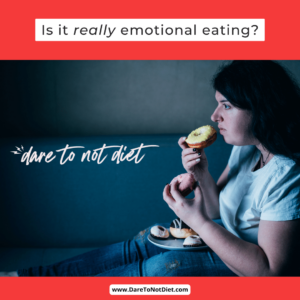Read the blog
Is Emotional Eating a Real Thing?

Are we really eating our feelings?
Do you identify as an emotional eater?
And if so, what does that mean to you? And is it something you feel good, bad or neutral about?
I asked chatGPT what it thought emotional eating was and it made a pretty valiant effort:
“Emotional eating is a term used to describe the practice of eating food in response to emotional triggers, such as stress, anxiety, boredom, or sadness, rather than in response to physical hunger. Emotional eaters use food as a coping mechanism to deal with their emotions and may experience a sense of comfort or relief when they eat…” -chatGPT
There was a bit more about overeating and weight gain which was not particularly scientific so I left it off. Overall I thought this was a definition most people would agree with.
But there is something missing from this definition and the reason I wanted to write about emotional eating. It doesn’t take into account how people feel about the food they are eating or their bodies. Emotional eating doesn’t happen in a vacuum.
Why emotional eating really happens
Here’s what was really happening for many “emotional eating” based on my clinical experience:
They were trying to be “good” all day with their eating by following diet rules to control their weight. They are trying to control their weight because they feel bad about their bodies.
Or, they would eat food they considered “bad” for them that they’d been trying to avoid in the name of “health” (or weight control).
But when a negative emotion happened, they’d run to the exact food they’d been trying to avoid and eat a lot of it all at once, often to the point of discomfort.
If someone is restricting either physically or mentally (creating a sense of deprivation), then negative emotions will be your body’s way of taking advantage of vulnerability to get itself fed.
Diets = Restriction
If you have been intent on avoiding dessert for most of the rest of your life in order to control your weight, this will most certainly create a sense of deprivation that your brain will translate to Starvation Alert!
That’s right – even thinking you can’t have something can make your brain fear it’s not going to get enough. Why? Because starvation has been a reality for humanity for most of our history.
So if you are in that deprivation mindset, and an upsetting emotion comes along (or maybe even an intensely happy one), and that food or something like it is available somewhere, your brain will use this moment of vulnerability to make you eat it.
And you’ll blame the emotions, because diet culture has told you it’s normal and doable to diet (it isn’t).
And then you’ll think you’re an emotional eater. But you aren’t eating your feelings; your feelings are simply getting you to eat.
In my experience, once we fix the deprivation (which I help people do using a non-diet framework that works really well), emotional eating disappears. Hunger becomes the primary driving force of eating. (Hunger cues sometimes need to be rehabbed first). And when that happens, you can be reassured you are eating the right amount for your body most of the time.
How to not emotionally eat
Get tips on how to divest yourself of diet culture and eat normally with my free guide 5 Strategies to Stop Overeating.
If you’d like to see what help for emotional eating would look like, schedule a free 30 minute chat with me. If you have BCBS, your nutrition counseling may be completely covered.
Comments Off on Is Emotional Eating a Real Thing?